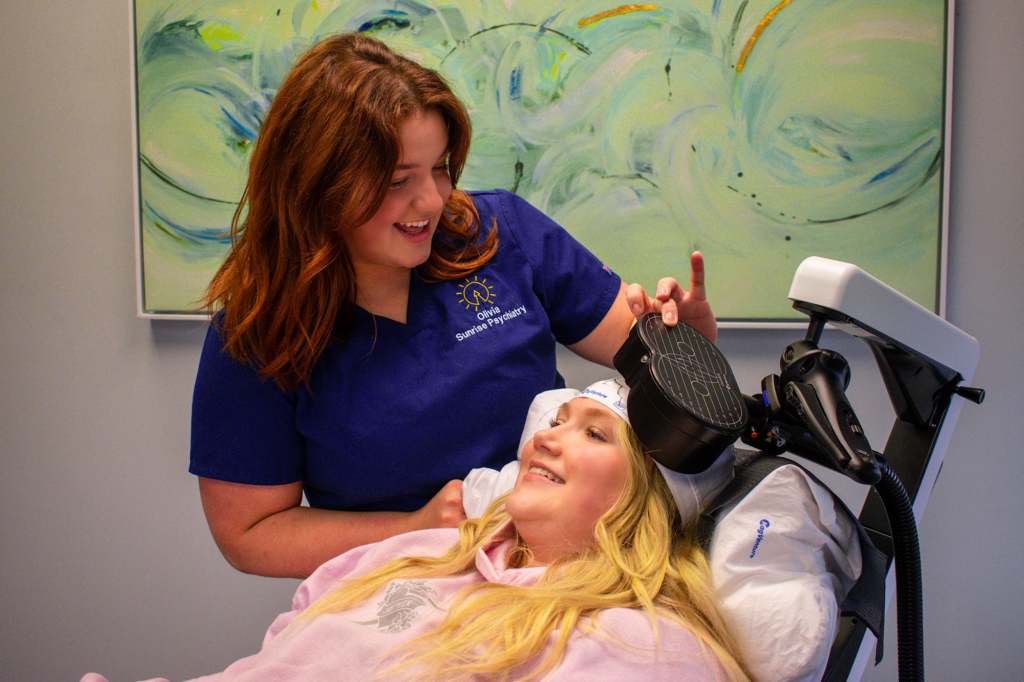Transcranial Magnetic Stimulation (TMS) therapy is a noninvasive, FDA-approved treatment for major depression and anxiety, especially in cases of treatment-resistant depression. By using magnetic pulses to stimulate specific areas of the brain, TMS has shown promising results in clinical trials, offering a new option for patients who haven’t responded to traditional treatments. This innovative therapy provides hope for improving mental health and alleviating the symptoms of depression.
Drug-Free Relief for Depression Symptoms
Transcranial Magnetic Stimulation (TMS) offers a drug-free alternative to antidepressant medication, especially for those who experience intolerable side effects or non-response. Unlike antidepressants or electroconvulsive therapy (ECT), TMS therapy doesn’t involve sedation, electrical current, or systemic drugs. This noninvasive treatment targets brain areas linked to mood regulation, providing relief for patients with major depressive disorder and anxiety for those who haven’t responded to psychotherapy or medication. It is currently being investigated to treat bipolar disorder and post-traumatic stress disorder.
FDA-Approved and Evidence-Based
Repetitive Transcranial Magnetic Stimulation (rTMS) is an FDA-approved treatment for major depression and obsessive-compulsive disorder (OCD), offering a drug-free alternative for those who haven’t responded to traditional therapies. Supported by clinical trials, rTMS uses magnetic pulses to stimulate brain areas linked to mood and behavior. With growing awareness in psychiatry and healthcare, more providers and clinics are offering TMS treatment, making it a trusted option for effective relief from these conditions.
Noninvasive and Well-Tolerated
TMS therapy uses a magnetic coil to deliver targeted magnetic pulses to the prefrontal cortex, helping regulate mood. As an outpatient procedure, it requires no sedation or hospital stays, making it convenient and accessible. The risk of seizures is minimal, with a lower risk than most psychiatric medications, and for those with no history of seizures or epilepsy. Patients are treated in a comfortable environment during sessions, offering a quick, noninvasive treatment for depression and other mental health conditions. Mouthguards and earplugs are offered to minimize potential discomfort.
Few Side Effects Compared to Other Treatments
TMS therapy has minimal side effects, such as scalp discomfort or a slight headache, especially compared to antidepressants or electroconvulsive therapy (ECT). It avoids long-term cognitive side effects or memory loss, making it ideal for those with treatment-resistant depression who can’t tolerate medication. Unlike antidepressants or ECT, TMS doesn’t cause systemic side effects like weight gain, sexual dysfunction, or gastrointestinal issues.
Broadening Applications and Future Potential
Studies show that TMS therapy offers benefits for conditions like depression, OCD, smoking cessation, and chronic pain. Ongoing research in the benefit of magnetic brain stimulation of neurons is expanding mental health treatment to likely include substance abuse treatment, bipolar depression, PTSD, and ADHD. TMS’s role in improving brain activity, also known as neuroplasticity, can be used alongside psychotherapy, offering a versatile treatment option.
TMS Therapy: A Promising Option
In conclusion, TMS therapy offers drug-free relief, FDA-approved treatment with minimal side effects, and a noninvasive approach, making it a promising treatment option for those who haven’t found relief with other methods. If you’re considering TMS treatment for depression, anxiety, or other mental health concerns, contact Sunrise Psychiatry today and/or take a self-assessment to see if TMS therapy is right for you.

